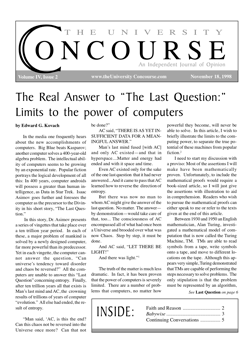Charity requires us to proclaim the fullness of Truth
by Alice von Hildebrand
Joanna Bratten’s article “Pluralism and Orthodoxy” calls for comments. I shall limit myself to her problem of balancing the acceptance of other religions while upholding her faith as being absolute Truth.
The first thing I would like to challenge is her claim that we should accept other religions. No one is required to do so. Ecumenism does not mean to “accept other religions”—far from it—but to have a loving and reverent attitude toward those who do not benefit from the fullness of revealed Truth. It challenges us to rejoice over every bit of truth we discover in them, but we should never accept what is false or partially false.
She tells us that she once had dinner with a young Muslim, “very pious, very disciplined,” indeed more so than the Catholics present. She feels that it would have been “absurdly arrogant” to suggest that his faith was insufficient to him. My response would have been very different. First of all, meeting a Muslim who practiced his faith dutifully would have been a good occasion of humbling myself. It is shameful indeed that I, who have received the plenitude of revealed truth should be so tepid when this young man lives up to the demands made to him so faithfully.
Moreover, I would have said to myself: what a good Catholic he would make if he only benefited from the graces of the true faith, and of the unfathomable gift of the sacraments. May God grant him this grace.
Thirdly, I would have felt a calling to pray ardently for this young man God had placed in my path, for Truth is for all people, independent of race, sex or color.
Moreover, Ms. Bratten’s statement that it would have been absurdly arrogant to suggest that the young Muslim’s faith was insufficient to him is very ambiguous. What does she mean? That being comfortable and fulfilled in his beliefs, it would be absurd “to disturb his circles” or does she mean that because he was sincere, he did not need to have the full truth because he could be saved without it?
Alas, very few men can resist the Zeitgeist. Since Luther, the only concern of most people seems to be the question of salvation. All of us have heard the question “are you saved?”. If the answer is in the affirmative, people are satisfied that nothing more is needed.
What is sadly neglected is the question of truth. The primary end of man is not salvation but the glorification of God, and God can only be glorified “in the spirit and in Truth.” What is totally overlooked in our subjectivistic and relativistic society is that every untruth (particularly when it refers to matters of supreme importance, such as the nature of God) creates a metaphysical dissonance, and a discordance in the symphony of the universe. Plato has seen this; my late husband has underlined it repeatedly, and John Paul II has highlighted it magnificently in Veritatis Splendor. To deny that God is a Trinity, that Christ is God, that He alone is the Savior of the world must make the Angels weep, even though these terrible errors are held by people who are victims of invincible ignorance. Christ commanded us to spread His Truth (for He alone is the Truth) to the whole world. It is a duty of charity, and charity suffers no exception.
Alice von Hildebrand
Dr. von Hildebrand is a philosopher who collaborated in the work of her late husband, Dietrich von Hildebrand, and taught for over thirty years at Hunter College in New York. In addition to writing and lecturing, she now hosts a program on feminism and feminity for EWTN. She is a trustee of Franciscan University.


